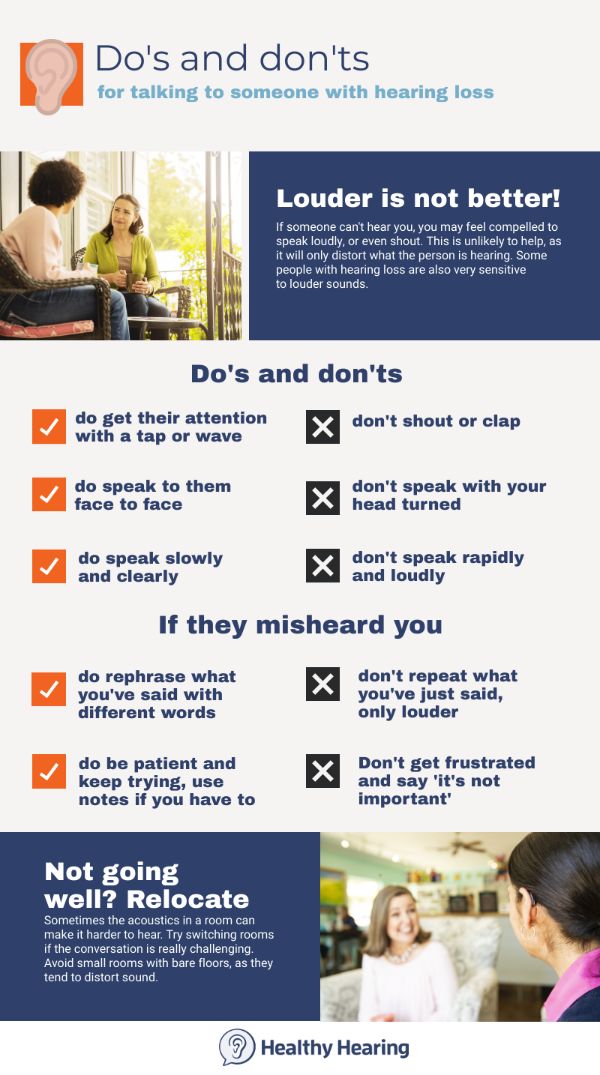|
www.HealthyHearing.com |
Hearing loss can increase loneliness—here's what to do about it
Contributed by Madeleine Burry One of the inspirations for the Talkabout study, which pairs people living alone with conversational partners for biweekly video chats, was an encounter Geoff Plant, founder of the Hearing Rehabilitation Foundation, had in the park. It was the early days of the pandemic, and Plant was masked up. He stopped to chat with an older woman, but could tell she was struggling to comprehend him through the mask. “I walked away with this terrible feeling of inadequacy,” says Plant, who retired in 2016 and is now a full-time volunteer with the organization. “I felt so sorry for her.” He’d been aware of the issue of loneliness with people hearing loss for a long time, but the moment struck a chord. “I started seeing figures of the percentage of older people with hearing loss who live alone—it’s startlingly high,” he says. This all percolated, leading to the idea of bridging the gap with help from technology. Participants in the Boston-based Talkabout study are loaned a special videophone device, known as the Facebook Portal, to participate in ongoing conversations with an assigned partner. When the study ends, the study team will evaluate whether it helped alleviate loneliness.
Loneliness is a major concernEven before waves of shutdowns due to COVID-19, the United States was experiencing a loneliness epidemic. And, in February 2021, a report from Making Caring Common found that 36 percent of all Americans feel serious loneliness. Don’t dismiss this emotion: Being lonely is associated with increased rates of depression, anxiety, and suicide, according to the Centers for Disease Control and Prevention (CDC). And hearing loss can accentuate social isolation and loneliness: One frequently cited study found that each decibel decrease in hearing perception increased the odds of developing severe loneliness by 7 percent. Here’s what you need to know about the connection between hearing loss and loneliness. What’s the difference between social isolation and loneliness?It’s easy to group social isolation and loneliness together (in fact, researchers often study them jointly) but they are distinct phenomena:
What’s clear: Hearing loss makes social isolation more common, and this in turn can lead to feeling lonely. “My clinical experience has been that a lot of people, a lot of my patients, have said, ‘I don't feel like going out with whomever, my friends anymore, because I can't hear them and I can't participate in the conversation,’” says Cynthia A. Modrosic, AuD, of Professional Hearing Center in Missouri. 
social connections and hobbies. While some shrinking of your social circle may occur naturally with age, it’s more pronounced for older people with hearing impairments, according to research. A lack of face-to-face contact can make both social isolation and loneliness worse for people with hearing loss. Technology can only help so much, points out Modrosic. Many of her patients use older flip phones, putting video chat services like FaceTime out of reach. And, she points out, not everyone has reliable internet or cell service to use video chat programs. If you or your loved one doesn't have access to videochat and smartphones, there are government-funded free and steeply discounted captioned phones that make standard phone communication much easier. More: Why you should consider joining a hearing loss support group How treating hearing loss can ease lonelinessIf hearing loss can increase isolation and loneliness, it stands to reason that improving someone’s ability to hear has the potential to alleviate those problems. However, there isn't a lot of data on that yet: A 2020 systematic review on the topic stated more research is needed to measure whether hearing loss treatment helps with loneliness. Courtney Voelker, MD, PhD is a board-certified neurotologist and director of the Adult & Pediatric Cochlear Implant Program at Pacific Neuroscience Institute at Providence Saint John’s Health Center. Many of her patients arrive with a family member who describes them as being withdrawn, socially isolated, and depressed. “After being fit with hearing aids or undergoing a surgical cochlear implant, these same patients return with a smile and their family reporting that they are a changed person,” Dr. Voelker says. “This is very rewarding to me as a neurotology surgeon.” Hearing aids are part of the solutionHearing aids are one very important tactic to treating hearing loss. But, Modrosic points out: “Hearing aids aren’t the solution; they’re part of the solution.” Appropriate counseling from an audiologist plays a significant role in helping people hear better, she says. This includes auditory rehab. Audiologists may recommend common-sense but meaningful adjustments such as:
When it comes to loneliness, we all have a role to play. “We quite happily fit hearing aids for people without asking the obvious question: Who are you going to talk to with these?” Plant points out. If you have friends and family with hearing loss, include them in social gatherings, call them on the phone, meet them outside, or see them with masks on, Modrosic says. The Talkabout Study is still ongoing, but Plant points to early positive indications. “That little angel has made such a big difference in my life,” Plant says one of the participants said about a weekly conversational partner. Madeleine Burry
|
Featured clinics near me
Earzlink Hearing Care - Reynoldsburg
7668 Slate Ridge Blvd
Reynoldsburg, OH 43068

Find a clinic
We have more hearing clinic reviews than any other site!




 Madeleine Burry is a Brooklyn-based freelance writer and editor. She's written about health for several online publications, including Women's Health, Prevention, Health, Livestrong and Good Housekeeping. You can follow her on Twitter @lovelanewest.
Madeleine Burry is a Brooklyn-based freelance writer and editor. She's written about health for several online publications, including Women's Health, Prevention, Health, Livestrong and Good Housekeeping. You can follow her on Twitter @lovelanewest.